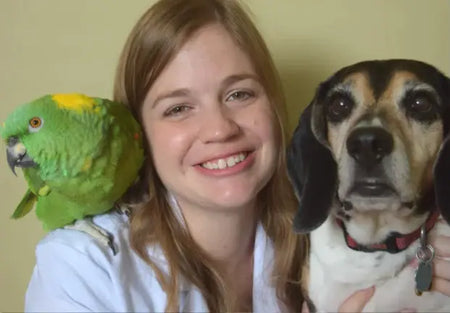In This Article
To understand how holistic treatment differs from conventional medicine let's examine what holistic means. The word holistic is defined as “treatment of the whole patient, taking into account mental and social factors, rather than just the symptoms of disease”.
Typically, holistic veterinarians practice more of an “integrative” approach to veterinary medicine. Meaning they combine both eastern and western practices to provide the best possible treatment plan for the individual patient. I like to think of holistic veterinary medicine as giving me more “tools” in my toolbox for the treatment of my patients. Whether your pet has feathers, fur, or scales, holistic practices can be incorporated to improve the overall well-being of your pet. So, what exactly can holistic services offer you?
1) Preventative Care
It is best to establish a strong foundation in your animal’s health from day one. While initial vaccinations are generally recommended, vaccine requirements can change as your pet ages. Each animal’s lifestyle and exposure levels should be taken into consideration when making vaccine recommendations. Titer testing can also be administered to avoid over-vaccinating. A titer test is an antibody blood test that can tell you if a previous vaccine is still protecting your dog's immune system.
2) Diet Analysis
Diet is a hot topic these days as one size does not fit all. Should you feed raw or kibble? How much processing is too much? Should you cook for your pet? In my integrative practice, we see patients that are fed all types of diets, and we work with clients to help them select the best choices for their pets. There are certainly pros and cons for all diets, and we will be exploring these in a later blog. Stay tuned!
3) Acupuncture
Acupuncture needles stimulate nerves in the central nervous system. This stimulation helps improve circulation and releases endorphins which help reduce discomfort. Acupuncture is a great tool for the treatment of multiple ailments. While this is often used in more senior patients with mobility issues, it can also be an adjunctive treatment for GI disorders, urinary disorders, and so on. Acupuncture is targeted to the individual and the success of treatment is dependent on that patient’s response and tolerance.
4) Cold Light Laser Therapy and Assisi Loop Therapy
Cold light laser therapy is a tool that stimulates cell repair and reduces discomfort. This is commonly used in patients with mobility concerns and for wound healing.
Assisi Loop Therapy uses a pulse electromagnetic field to reduce inflammation and discomfort. This unique tool is placed over the area of concern and has been proven to help reduce discomfort associated with arthritis, inflammation related to gastrointestinal disorders, anxiety, and much more.
5) Herbal Therapy
Herbal treatments have been used for centuries and have maintained their usefulness. Today these treatments include both western and eastern herbal formulas. Depending on the diagnosis, herbal therapy may be offered to your pet. In general, these supplements do not yield instant results. It will often take several days to see if they are working.
Herbal remedies can be used in both acute and chronic cases and may have a synergistic effect with medications, meaning they help reduce the number of pharmaceuticals needed to manage certain diseases.
Summary
Holistic veterinarians have a variety of treatment plans to help address the needs of the whole patient. This blog only covers a handful of the therapies available. Other therapies include chiropractic care, massage therapy, and physical rehabilitation. Contact your local holistic veterinary clinic if you are interested in seeking holistic care for your pet and want to learn more about available treatment options.
Sources
- “Holistic.” Oxford Languages, languages.oup.com/google-dictionary-en. Accessed 8 Oct. 2021.
- “Holistic Veterinary Therapies – American Holistic Veterinary Medical Association.” AHVMA, 2021, www.ahvma.org/holistic-veterinary-therapies.


